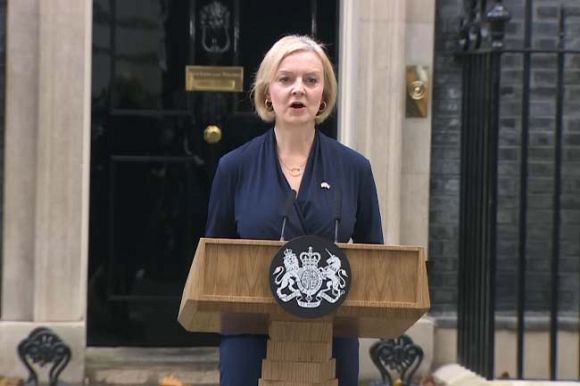The sudden departure of Britain’s new Prime Minister has valuable messages for the watching world, as Alan Austin reports.
THE SHORTEST prime ministership in British history – with Liz Truss announcing her resignation after 44 days – is not just a political disaster for the Conservative Party in the United Kingdom. It has powerful lessons on economic policy for the rest of the world.
The central message is that the economic programs of contemporary right-wing political parties which favour the corporate sector and the richest citizens are doomed to failure.
It is important to remember that Liz Truss and her Chancellor of the Exchequer, Kwasi Kwarteng, were not just stop-gap seat warmers hoping to nurse the Tories to the next election after Boris Johnson’s departure in disgrace. Truss and Kwarteng are right-wing economic ideologues diligently pursuing a platform they had formulated over many years and believed would save Britain’s embattled economy.
In 2012, they published the book, Britannia Unchained: Global Lessons for Growth and Prosperity, with three other Thatcherite Tories, in which they advocated lower taxes on corporations and the rich, fewer business regulations, less protection for the environment and easier processes for sacking workers.
Indicators of economic collapse
All five authors eventually found themselves promoted to Boris Johnson’s Tory cabinet and gradually implemented their programs. The results have been disastrous. Virtually all key indicators of economic success have deteriorated since the Tories won office in 2010, many of them exacerbated by the ill-advised decision to leave the European Union, but not caused by that.
Trade has boomed worldwide since 2018, with OECD member countries enjoying an average 10% increase in export volumes over that time. Eight developed countries have had rises above 20%, including Ireland and Chile which have managed better than 40%.
Exports from the UK, in contrast, have declined by 8.1% over that period. See blue chart, below.

Britain’s economic growth has been among the OECD’s laggards, with GDP in the last two quarters rising by only 0.7% and 0.2%. Inflation has increased steadily since early 2021 and is now above 10%.
The pound sterling has tumbled badly against the U.S. dollar and is now close to the all-time low of $1.07.
Between June 2017 and June 2022, France’s CAC 40 stock market index increased 20.8%, Japan’s Nikkei 225 rose by 39.3% and the U.S. Dow Jones Industrial Average improved by 44.9%. Over that time, Britain’s FTSE 100 grew by a miserable 1.53%. So much for helping the top end.
Stagnant productivity
Britain’s labour productivity has increased from 100 index points in the fourth quarter of 2017 to 101.8 in this year’s second quarter. That’s an appalling gain of just 1.8% in four and a half years.
That contrasts with a 10.8% rise over the same period in Poland, 11.6% in South Korea, 21.2% in Taiwan and 25.2% in neighbouring Ireland.
Other indicators to have collapsed under the current Tories include wage growth, household disposable income, employment inactivity, retail sales, industrial production and tourist arrivals.
The critical disastrous decisions
Since the Conservatives won office in 2010, the faction which favours shifting wealth and income from workers to the corporate sector and from the poor to the rich has gained ascendancy. It succeeded in 2011 in cutting the corporate tax rate from 28% – arguably the optimum level – to 26%. It was slashed further over the next six years to just 19% in 1917. The top rate of income tax was also cut from 50% to 45%.
As these took effect, wealth flowed out of the British economy at an accelerating rate, government revenue declined and budgets remained in deep deficit. The national debt deepened from 75.7% of GDP in 2012, just after the Global Financial Crisis, to 82.8% in 2019, pre-pandemic. Meanwhile, well-managed economies generated healthy budget surpluses and reduced their debt over that period.
Britain’s national debt was 95.9% of GDP last year and will be much higher this year.
Experiences abroad
Economists watched Australia’s economy gradually decline from 2014 to 2022 as corporate tax evasion ate away at the nation’s revenue and as rorts and waste led to totally unnecessary deficits and ever-expanding debt.
More recently, they observed the collapse of the U.S. economy after Donald Trump slashed taxes on the rich in 2017. Since then, U.S. deficits have worsened, the debt has deepened and the interest on the debt has become a burden that will bedevil America’s economy for at least a generation.
This is why when Truss and Kwarteng announced further tax cuts, the markets said, “Okay. That will wreck the British economy even further. We are out of here!” — the response that triggered, first, Kwarteng’s sacking and then Truss’ resignation.
Media mendacity
If the consistent experience in Australia, Britain, the USA and elsewhere proves that right-wing economic policies always fail, why on Earth do voters keep voting conservatives back in?
Mediacloud.org tracks topics covered by the UK national media going back to the early 1990s. The grey chart, below, shows the level of attention on national debt since 1995.

(Data sources: Mediacloud, Trading Economics)
Clearly, there is no relation whatsoever between the actual level of the national debt and media coverage thereof. The two striking features of the blue line in this graph are the surge around May 1997 and then the sudden drop in interest in May 2010. Those were the dates when Labour took office and then left office, respectively.
We can make similar graphs for other indicators of economic health. We can make graphs also for Australia and the USA.
In all three countries, the craven mainstream economic media operate primarily to deceive readers and viewers into believing conservatives manage the economy better than progressive parties.
The hard, cold facts show overwhelmingly that the opposite is the reality.
Alan Austin is an Independent Australia columnist and freelance journalist. You can follow him on Twitter @alanaustin001.
Related Articles
- Britain's Conservative Party is collapsing on itself
- Liz Truss' speech does little to assuage abysmal approval ratings
- Elite rule: Liz Truss' socially exclusive cabinet
 This work is licensed under a Creative Commons Attribution-NonCommercial-NoDerivs 3.0 Australia License
This work is licensed under a Creative Commons Attribution-NonCommercial-NoDerivs 3.0 Australia License
Support independent journalism Subscribe to IA.















